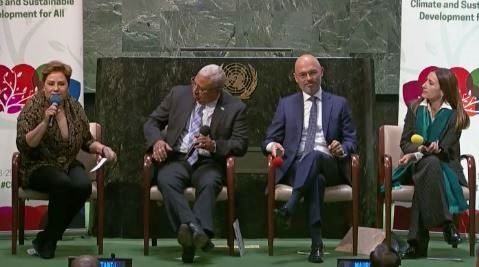Just over a decade is all that remains to stop irreversible damage from climate change, world leaders heard recently at a General Assembly high‑level meeting on the relationship between climate change and sustainable development.

The meeting focused on the protection of the global climate for present and future generations, in the context of the economic, social and environmental dimensions of the 2030 Agenda for Sustainable Development.
“We are the last generation that can prevent irreparable damage to our planet,” General Assembly President María Fernanda Espinosa Garcés of Ecuador warned the gathering, stressing that 11 years are all that remain to avert catastrophe. Highlighting the meeting’s theme, Ms. Espinosa called for an intergenerational approach to climate change.
“Climate justice is intergenerational justice,” she said.
Pointing to intensified calls by youth leaders for action on climate change, she added that 2019 must be a year of climate action at all levels. Drawing inspiration from the thousands of students worldwide demanding tangible action, she called on world leaders to make 2020 the last year carbon emissions increase due to human activities.
UN Secretary-General, António Guterres, said no country or community is immune to climate-related devastation, with the poor and vulnerable the first to suffer and the worst hit.
He launched an appeal for aid to the around three million people affected by cyclone Idai in Mozambique, Malawi and Zimbabwe, and noted such events are becoming more frequent and will become worse without urgent, immediate action.
He also said that humankind had the tools to address the crisis in the 2030 Agenda for Sustainable Development and the Paris Agreement on climate change. “But tools are no use if you don’t use them,” he stressed, adding: “We need action, ambition and political will.”
The UN Secretary-General called on leaders the Climate Action Summit in New York on 23 September with concrete, realistic plans to enhance nationally determined contributions by 2020.
He asked leaders to demonstrate how to reduce greenhouse gas emissions by 45 per cent over the next decade and achieve net zero global emissions by 2050, to ensure no one is disadvantaged by climate action and to demonstrate how such action leads to job creation, lower air pollution and improved public health.
Discussions during the Assembly touched on the achievements of the two most recent UN Climate Change Conferences, as well as the expectations for UN Climate Change Conference COP25 in Chile this December.
At COP24 in Poland last year, governments adopted a robust set of guidelines for implementing the landmark 2015 Paris Climate Change Agreement.
Fiji’s Prime Minister Frank Bainimarama, who served as President of COP23 in 2017 in Bonn highlighted the fact that whilst the gathering featured disagreements and some finger pointing, the spirit of cooperation and understanding prevailed.
Michał Kurtyka, Secretary of State at the Ministry for Energy and Environment of Poland and President of COP24, said that a people-centred approach to climate change mitigation had emerged in Katowice.
For her part, Carolina Schmidt, Minister for Environment of Chile and President of the upcoming COP25, said discourse now needed to shift towards change and action with the understanding that climate change and poverty are linked.
All three COP Presidents, former and incoming, called on world nations to increase their climate ambition so that 1.5 degrees C goal of the Paris Agreement can be achieved.
Patricia Espinosa, Executive Secretary of UN Climate Change, noted that the successes of the last two UN Climate Change conferences had proven that multilateralism is alive and ready to address the challenges of climate change. “But there is no time to lose,” she warned.
